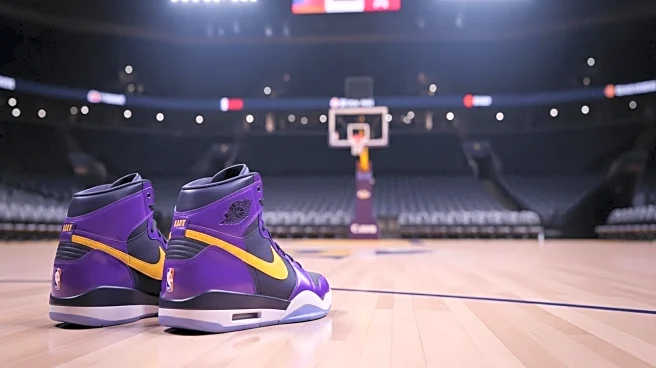What's Happening?
LeBron James, a key player for the Los Angeles Lakers, is sidelined at the start of the 2025-26 NBA season due to a nerve injury causing sciatica. The Lakers plan to be cautious with his recovery, with a reevaluation scheduled in three to four weeks. This absence is significant for the team, as James is known for his versatile and physical presence on the court, contributing as a playmaker and scorer. The Lakers will rely on Luka Dončić and Austin Reaves to lead the team during James's absence. Dončić, who has been receiving early MVP buzz, is expected to carry an increased level of responsibility, while Reaves will have more on-ball opportunities.
Why It's Important?
LeBron James's absence could impact the Lakers' performance and playoff prospects. His ability to score and defend is crucial for the team's success. Without him, the Lakers may need to adjust their strategy, potentially slowing down their game. Luka Dončić's performance during this period could bolster his MVP candidacy, especially if the Lakers maintain a strong position in the standings. Austin Reaves's increased role could also be pivotal, as the team needs him to deliver All-Star level production. The Lakers' ability to adapt and perform without James will be critical in determining their season trajectory.
What's Next?
The Lakers will monitor LeBron James's recovery closely, with a reevaluation planned in three to four weeks. During his absence, the team will focus on maximizing the contributions of Luka Dončić and Austin Reaves. Head coach JJ Redick may need to adjust player rotations to optimize performance. The Lakers aim to remain competitive and secure a strong position in the standings, which could enhance Dončić's MVP chances. Upon James's return, the team will need to reintegrate him smoothly, which may temporarily affect their performance as they adjust to his high-volume scoring and playmaking.
Beyond the Headlines
LeBron James's injury highlights the challenges of managing veteran players' health and the impact of injuries on team dynamics. The Lakers' ability to adapt without their star player could influence their long-term strategy and player development. The situation also underscores the importance of depth and versatility in a team's roster, as other players must step up to fill the void left by a key player. The Lakers' handling of this period could set a precedent for managing similar situations in the future.









